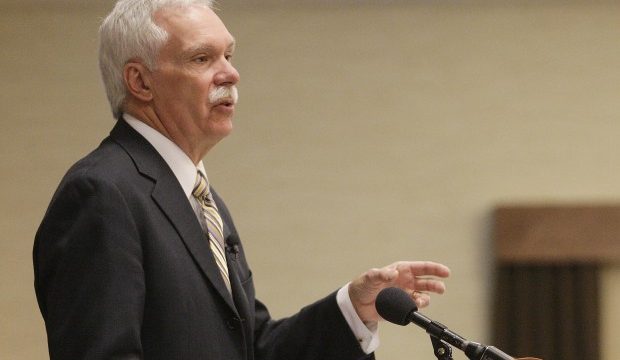Some Advice For Ed Schafer On Open Records Reform

If there’s something former Governor and current University of North Dakota President Ed Schafer knows a thing or two about it’s pushing policy changes through the legislative process. So when he says he’s going to back legislation to change North Dakota open records laws to exempt information about the first round of applicants for university president jobs, it should be taken seriously:
As of Tuesday evening the UND Presidential Search Committee had received 40 applications for president—three of them past deadline—and Schafer said he was concerned that none of them is a current, sitting president, something he blamed on open records laws making the names of applicants public.
“You know what? UND should not be a training ground for people who want to be president,” he said.
Others in higher education, including State Board of Higher Education Chairwoman Kathleen Neset, have expressed similar concerns with initial applications being made public.
Schafer didn’t provide a name but said he knew someone personally—a sitting university president and UND alumnus—who didn’t apply at UND because he couldn’t have his name publically associated with the search, especially if he didn’t ultimately get the job.
Schafer said he plans to be open with the public and the media during his tenure at UND “but in this case, there’s an element I think that is restricting the ability to attract the best possible people to these positions in the state.”
To fix the problem, Schafer plans to help create legislation for the 2017 legislative session that would in some way restrict access to the names of applicants for high-level government or public positions. He doesn’t have concrete plans yet but said the initial pool of applicants shouldn’t be made public because it keeps those already in high-level positions from applying. “There has got to be a way we can do this because I just think this university and other positions in the state ought to have the opportunity to attract really solid, experienced, capable people,” Schafer said.
I’ve been pretty clear in my position on this. As much as I respect Schafer as a leader, I’m not convinced that open records laws are the problem in attracting a better quality of candidate to lead the state’s universities. I would suggest that our university system’s propensity for turf wars and chaos made possible by a lack of leadership from the State Board of Higher Education and chancellor position is a more likely culprit.
Which isn’t to say that the pool of applicants for the UND president position (Schafer is acting as the interim president) was all that bad. Schafer thinks it’s terrible that no sitting university president applied for the job. I’d argue that maybe we don’t need to import yet another big ego into a leadership position at one of our universities.
[mks_pullquote align=”right” width=”300″ size=”24″ bg_color=”#ffffff” txt_color=”#000000″]There is a culture of hostility toward public disclosure and accountability at our universities, and it needs to be identified and condemned by the people in charge.[/mks_pullquote]
Maybe it’s time to think smaller.
But, if we’re going to go down this road, there may be room for some compromise. If Schafer and the university system are willing to give a little, maybe they’ll get this open records exemption.
Schafer and the university system could start by acknowledging reality, which is that transparency has been and continues to be a major issue for the universities. There is a culture of hostility toward public disclosure and accountability at our universities, and it needs to be identified and condemned by the people in charge.
It is more than a little galling that anyone in the university system would even think of asking for a narrowing open records laws without first taking this step.
Another way for Schafer and the NDUS to grease the skids would be to offer increased accountability elsewhere. Like perhaps the State Board of Higher Education finally agreeing to do 360 performance evaluations of the university presidents.
The university system has resisted doing these evaluations, saying they won’t do them unless the evaluations are exempted from open records laws (always with the exemptions, these people). But perhaps if they were willing to let the evaluations go forward lawmakers could see fit to allow information about the first round of president applicants to be exempt from open records requests.
Again, Schafer is an old hand at the politics of give and take at the Legislature. I hope he can understand that, given the university system’s track record, he’s going to have to give a little to get a little.




